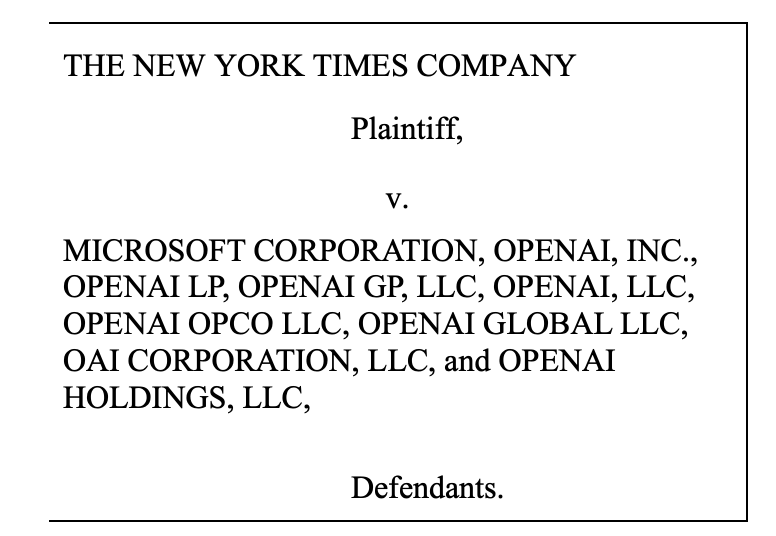In a groundbreaking legal move, The New York Times Company has filed a lawsuit against Microsoft Corporation and several entities of OpenAI, including OpenAI Inc., OpenAI LP, and others. This lawsuit, filed in the United States District Court for the Southern District of New York, marks a significant moment in the intersection of journalism, technology, and copyright law.
The Core of the Lawsuit: The New York Times alleges that OpenAI’s generative artificial intelligence tools, notably the GPT (Generative Pre-trained Transformer) models, have been trained using millions of copyrighted articles, opinion pieces, and other content owned by The New York Times without permission or compensation. This training, The Times argues, constitutes copyright infringement and unfair competition, as it diminishes the value of their original content and undermines their business model.
The Role of Microsoft: Microsoft, a key investor in OpenAI, is also named in the lawsuit. The Times contends that Microsoft’s collaboration with OpenAI in developing and commercializing the GPT models implicates them in the alleged copyright infringement. Microsoft’s Bing Chat and other AI-powered services, which integrate OpenAI’s technology, are said to directly compete with The Times by providing similar content generated from the GPT models.
Implications for Journalism and AI: This New York Times OpenAI Microsoft Lawsuit raises critical questions about the use of copyrighted material in training AI models. The Times asserts that their journalism, produced at significant cost and risk, is being used to train AI models that then create competing products. This not only infringes on their copyrights but also threatens the financial sustainability of quality journalism.
The Times’s Demands: The New York Times seeks damages, injunctive relief, and the destruction of all GPT models and training sets that incorporate their content. They argue that this relief is necessary to prevent ongoing damage to their business and to uphold the integrity of copyright law.
The outcome of this lawsuit could have far-reaching implications for the AI industry, particularly for companies developing technology using content that is not originally theirs. It also highlights the growing need for clear legal frameworks around the use of AI in relation to copyrighted material. As the case progresses, it will undoubtedly be watched closely by those in the technology, l
The implications of this New York Times OpenAI Microsoft lawsuit extend far beyond the immediate parties involved and resonate deeply within the burgeoning AI industry, particularly for startup companies venturing into this innovative yet complex field. As AI technology continues to evolve at a rapid pace, startups in this sector must navigate a labyrinth of legal considerations, including copyright laws and intellectual property rights. This case underscores the critical need for these emerging companies to seek guidance and expertise in intellectual property law. In this context, the role of seasoned attorneys like David Nima, Esq. of L.A. Tech and Media Law Firm becomes indispensable. With a specialized focus on intellectual property and technology law, Mr. Nima offers the acumen and experience necessary to help AI startups safeguard their innovations while complying with the intricate web of legal obligations. His expertise not only aids in protecting the valuable assets of these companies but also in steering them clear of potential legal pitfalls that could impede their growth and success in the highly competitive tech industry

